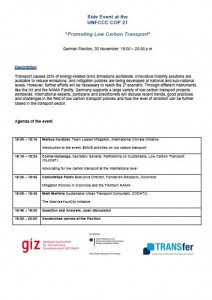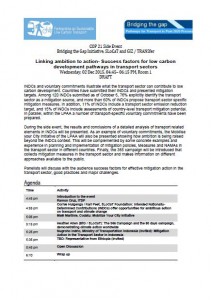EcoMobility World Festival 2015, Johannesburg
The ‘EcoMoblity World Festival 2015’ was one of the most unique events that have ever taken place in South Africa. The executive Mayor of the City of Johannesburg, Councillor Parks Tau, was a proud host of the world´s second-ever ‘EcoMobility World Festival 2015’, organised by the City of Johannesburg and ICLEI. Following the first ‘EcoMobility World Festival’ in Suwon, South Korea in 2013, the month-long car-free city district festival took place during South Africa´s Transportation Month from 1 – 31 October 2015.
 The location of the festival was the central economic hub of Sandton, Johannesburg. Sandton is the second largest Central Business District in Johannesburg and is characterised by very high traffic volumes. By closing down some of the major road lanes in and around Sandton, the festival literally visualised an ecomobile future for its local residents and visitors from all over the world. The overall objective was to promote behavioral change among citizens, demonstrate future modes of mobility, and highlight the imperative for climate protection as well as the role that mobility and individual behaviour play in securing a liveable city for future Generations, among others. These were demonstrated in different ways; for example, by promoting the use of public transport such as the Rea-Vaya BRT and the Gautrain as well as other forms of accessible, safe, attractive and fossil-free mobility like walking and cycling in and out of Sandton during the entire month of October.
The location of the festival was the central economic hub of Sandton, Johannesburg. Sandton is the second largest Central Business District in Johannesburg and is characterised by very high traffic volumes. By closing down some of the major road lanes in and around Sandton, the festival literally visualised an ecomobile future for its local residents and visitors from all over the world. The overall objective was to promote behavioral change among citizens, demonstrate future modes of mobility, and highlight the imperative for climate protection as well as the role that mobility and individual behaviour play in securing a liveable city for future Generations, among others. These were demonstrated in different ways; for example, by promoting the use of public transport such as the Rea-Vaya BRT and the Gautrain as well as other forms of accessible, safe, attractive and fossil-free mobility like walking and cycling in and out of Sandton during the entire month of October.
During the week of 5-8 October there were various forms of dialogues which were rich in content and attracted more than 500 participants from local governments, international organisations, academia and NGO from five continents. The dialogues comprised of a number of workshops and presentations given by experts which allowed an international and national exchange of knowledge and technical papers. On the 5th of October, Manfred Breithaupt from the GIZ co-hosted the Travel Demand Management workshop which described principles and strategies that imply a policy of demand management and activities to be developed with participants where hypothetical situations for their cities will be applied. The workshop touched upon strategies that seek to maximise the efficiency of urban transport systems by discouraging individual automobile use and promoting more effective, healthy and environment-friendly and non motorised modes of transport and reducing commuting journeys.
Furthermore, from 4 – 25 October, an exhibition which was organised by the South African National Energy Development Institute (SANEDI) on behalf of the City of Johannesburg formed part of the ‘EcoMobility World Festival 2015’. The exhibition offered an opportunity for both local and international entities to demonstrate and test their products with a walk-in live audience. The major purpose was to introduce the various EcoMobility alternatives to the public and business people in Sandton and to create a platform for the public to talk to the exhibiting organisations. The GIZ TRANSfer office in Pretoria was also granted an opportunity to set up an exhibition stand which attracted large numbers of visitors keen to receive information on GIZ´s activities.
 One of the substantial outcomes of the EcoMobility Dialogues was the Johannesburg Declaration on EcoMobility which was endorsed and strongly supported by experts and participants. The Johannesburg Declaration brings a strong message on EcoMobility, sustainable urban transportation and climate change to the United Nations Convention on Climate Change (UNFCCC-COP 21) which will be held in Paris in December 2015. Moreover, “the declaration summarises multiple benefits of EcoMobility for sustainable urban development and thus sends a signal towards the negotiations for Habitat III (October 2016, Quito) to bring sustainable urban mobility into the New Urban Agenda” (Ecomobilityfestival).
One of the substantial outcomes of the EcoMobility Dialogues was the Johannesburg Declaration on EcoMobility which was endorsed and strongly supported by experts and participants. The Johannesburg Declaration brings a strong message on EcoMobility, sustainable urban transportation and climate change to the United Nations Convention on Climate Change (UNFCCC-COP 21) which will be held in Paris in December 2015. Moreover, “the declaration summarises multiple benefits of EcoMobility for sustainable urban development and thus sends a signal towards the negotiations for Habitat III (October 2016, Quito) to bring sustainable urban mobility into the New Urban Agenda” (Ecomobilityfestival).







 One of the substantial outcomes of the EcoMobility Dialogues was the Johannesburg Declaration on EcoMobility which was endorsed and strongly supported by experts and participants. The Johannesburg Declaration brings a strong message on EcoMobility, sustainable urban transportation and climate change to the United Nations Convention on Climate Change (UNFCCC-COP 21) which will be held in Paris in December 2015. Moreover, “the declaration summarises multiple benefits of EcoMobility for sustainable urban development and thus sends a signal towards the negotiations for Habitat III (October 2016, Quito) to bring sustainable urban mobility into the New Urban Agenda” (
One of the substantial outcomes of the EcoMobility Dialogues was the Johannesburg Declaration on EcoMobility which was endorsed and strongly supported by experts and participants. The Johannesburg Declaration brings a strong message on EcoMobility, sustainable urban transportation and climate change to the United Nations Convention on Climate Change (UNFCCC-COP 21) which will be held in Paris in December 2015. Moreover, “the declaration summarises multiple benefits of EcoMobility for sustainable urban development and thus sends a signal towards the negotiations for Habitat III (October 2016, Quito) to bring sustainable urban mobility into the New Urban Agenda” (

